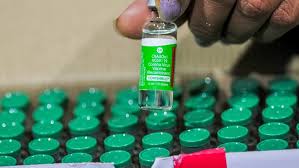
Pune-based Serum Institute of India (SII) stopped manufacturing its anti-Covid-19 vaccine Covishield in 2021, according to a statement issued by the company on Wednesday after British-Swedish pharmaceutical manufacturer AstraZeneca announced it was withdrawing its vaccine against Covid, Vaxzevria, due to “commercial reasons” as demand for it decreased globally.
Serum Institute of India locally manufactured Oxford-AstraZeneca Covid-19 vaccine under the brand name Covishield.
“With India achieving high vaccination rates in 2021 and 2022, coupled with the emergence of new mutant variant strains, the demand for previous vaccines diminished significantly. Consequently, since December 2021, we have stopped the manufacturing and supply of additional doses of Covishield,” an SII spokesperson said in the statement.
Of the two Covid-19 vaccines— Covaxin and Covishield— that were largely used in India under the nationwide Covid-19 immunisation programme, SII’s Covishield was administered the most with at least 170 crore doses administered so far since January 2021. The Covishield vaccine is a recombinant chimpanzee adenovirus vector vaccine.
India’s drugs regulator approved both Covishield and Covaxin for restricted use in emergency situation in the country on January 3, 2021. India’s National Covid-19 Vaccination Programme, which is the world’s largest vaccination programme, began on January 16, 2021, initially with the aim of covering the adult population of the country.
“We fully understand the ongoing concerns and it’s crucial to emphasize our commitment to transparency and safety. From the outset, we have disclosed all rare to very rare side effects, including Thrombosis with Thrombocytopenia Syndrome, in the packaging insert in 2021. Despite the challenges faced during the global pandemic, the safety of the vaccine remains paramount. Regardless of whether it’s AstraZeneca’s Vaxzervria or our own Covishield, both vaccines have been instrumental in saving millions of lives worldwide. We commend the collaborative efforts of governments and ministries in facilitating a unified global response to the pandemic,” said the SII statement.
An AstraZeneca spokesperson said in a statement, “We are incredibly proud of the role Vaxzevria played in ending the global pandemic. According to independent estimates, over 6.5 million lives were saved in the first year of use alone and over three billion doses were supplied globally. Our efforts have been recognised by governments around the world and are widely regarded as being a critical component of ending the global pandemic. As multiple, variant COVID-19 vaccines have since been developed there is a surplus of available updated vaccines. This has led to a decline in demand for Vaxzervria, which is no longer being manufactured or supplied.”
“We will now work with regulators and our partners to align on a clear path forward to conclude this chapter and significant contribution to the COVID-19 pandemic,” added the statement.
The AstraZeneca spokesperson said the group had begun the process by taking it off the market in the Europe, Middle East and Africa (EMA) region.
The AstraZeneca’s recent disclosure in UK Court about its anti-Covid19 vaccine causing Thrombosis with Thrombocytopenia Syndrome (TTS) “in very rare cases” created uproar.
The Daily Telegraph reported that in a legal document submitted to the high court in London in February for a class action being fought, AstraZeneca admitted that their vaccine developed in partnership with the University of Oxford to protect against Covid-19 may cause Thrombosis with TTS in “very rare cases”.
TTS (Thrombosis with Thrombocytopenia Syndrome) is a rare syndrome wherein thrombosis (formation of blood clots in the blood vessels) and thrombocytopenia (low platelet count) occur.
According to the European Medicine Agency document on side-effects of the Vaxzevria vaccine, thrombosis in combination with thrombocytopenia (thrombosis with thrombocytopenia syndrome, TTS) and Guillain-Barré syndrome (a neurological disorder in which the body’s immune system damages nerve cells) may affect up to 1 in 10,000 people.
The company is fighting a class action suit wherein 51 cases seeking damages worth nearly 100 million pounds have been filed with the high court. Jamie Scott filed the first case in 2023. Scott had been left with a permanent brain injury after developing a blood clot and a bleed on the brain, since April 2021 when he received the vaccine.
Experts, however, dismissed the concern saying anti-covid vaccines proved more beneficial in saving lives than a health hazard, “Vaccine safety is important and is a primary focus of study for all vaccines. But it is always important to balance benefit and risk, and all licensed vaccines deliver much more benefit and very small risk,” said vaccine scientist, Dr Gagandeep Kang.





